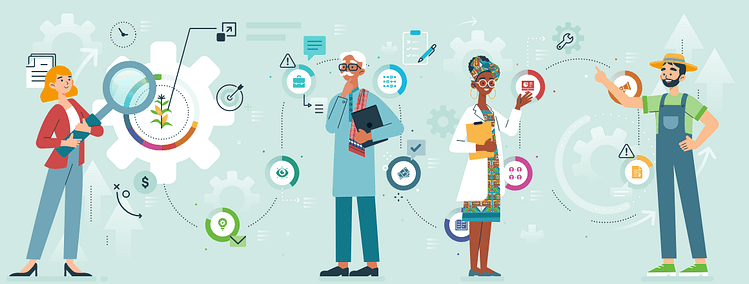January 10, 2023

The Scaling Scan website has been launched offering the latest news, manuals, videos, trainings, a directory of consultants, and a forum to engage with peers and experts on how to use the Scaling Scan tool to support scaling processes.
The website, which was developed by Lennart Woltering, scaling advisor with the International Maize and Wheat Improvement Center (CIMMYT), and the Scaling team in CIMMYT, builds on the success of the Scaling Scan, a user-friendly tool designed for anyone to learn about scaling: appreciate that context is king, that innovations don’t scale alone, and that collaboration is key for success
“The idea behind the Scaling Scan has always been to make it accessible to users of all levels, to bring the discussion on scaling to the ground and therefore, just like the tool, the materials on the site are available in English, French, and Spanish,” said Woltering.
It features materials used in training programs and workshops by CIMMYT’s scaling team over the past five years, repurposing them neatly for users around the world to assess the scalability of their own pilot projects and innovations. The website also includes a forum where users can engage in conversations, exchange information, and ask experts and other users questions and advice related to scaling. The platform also acts as a conversation space, allowing users around the world to share their experiences with the Scaling Scan, ask questions, and learn from each other. This has the added benefit of helping the Scaling Scan team understand on the ground needs so that they can create more user-friendly content.
“The demand for Scaling Scan workshops has been overwhelming, within CIMMYT, the CGIAR, but also with development organizations like Catholic Relief Services and GIZ and the private sector and we realized that we should bank much more on its biggest asset: accessibility. So, in 2022 we started with trainings for facilitators and the website serves as the platform for them to draw inspiration, materials, and methodologies how to apply the Scaling Scan in their context,” said Woltering.
Scaling is a process that aims to achieve sustainable change at scale. This means that not only should many people benefit from a new technology, but the results of a particular project should carry over beyond its immediate context and transform communities for the better.
It’s a complex process, and there is no one single recipe or blueprint. The Scaling Scan can, however, give direction to scaling new projects and highlight key factors scaling teams need to look out for
“The Scaling Scan aims to provide a framework for people to understand how much they should scale, and what else should be taken into consideration, in addition to the technology, for the next steps in their scaling process,” said CIMMYT Scaling Coordinator Eva Marina Valencia Leñero. “It also intends to show that scaling is not only about focusing on where the innovation is ready or mature, but also whether there are enabling conditions – what we call scaling ingredients – surrounding this innovation that managers have to plan for if they want their innovation to last in the long-term.”
“Considering that the core of the tool was developed at a kitchen table with three people over two days with no funding, it is amazing that the tool has served more than 2,000 people in the last five years,” said Lennart. With support from GIZ, the Scaling Scan is now being digitized which allows for the development of different versions, for example one with more emphasis on social inclusion or on climate mitigation for the One CGIAR Low-Emission Food Systems (MITIGATE+) Initiative. The lessons from over five years of applying the Scaling Scan from rural areas in Honduras to Bangladesh are currently being written up.
https://scalingscan.org/